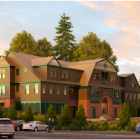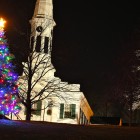Government
Town Rejects Petition from ‘New Canaan Residents Against Destructive Development’
|
Saying a formal application has not yet been filed for a large multi-family development in the neighborhood, the town is denying a petition from residents in the area of Brushy Ridge Road to revoke a permit for a 16-foot-wide driveway.
According to a group of neighbors calling itself ‘New Canaan Residents Against Destructive Development,’ town officials knew for years that the owner of vacant parcels at 17 and 23 Hill St. (also known as lots 72 and 812) intended to construct a 101-unit affordable housing complex there. In filing a March 17 petition with the town to revoke the permit, the property’s owner— Hill Street-72 LLC—“submitted inaccurate and conflicting information regarding the area of disturbance in the wetlands” when seeking the wider driveway four years ago. The property owner also “has engaged in construction activities on the Property that exceed the limitations of the Permit and the conditions on which it was granted,” the group’s attorney, Frank Silvestri of Westport-based Verrill Dana LLP, said in the petition. Yet, according to Town Attorney Ira Bloom of Westport-based Berchem Moses PC, the claim “fails for two basic reasons.”
“First, no application for a multi-family development has been filed in the four plus years since the crossing was approved,” Bloom wrote in a response dated April 8 that was obtained by NewCanaanite.com.
“As you know, the law is clear that the Commission is not permitted to speculate beyond what is provided,” Bloom said in the response letter.





